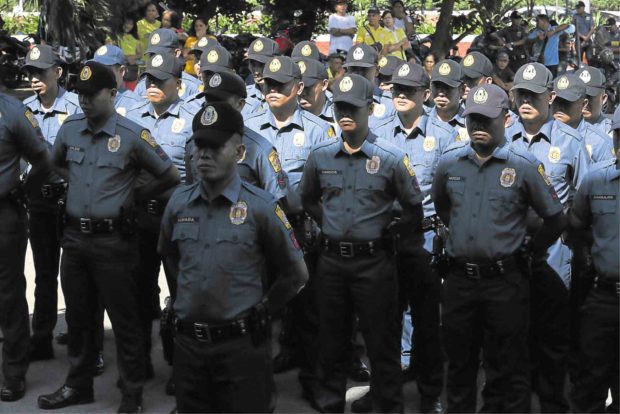Duterte signs law giving PNP chief, CIDG execs power to subpoena

The Philippine National Police gains the same legal authority exercised by the courts and several government agencies. —NIÑO JESUS ORBETA
President Duterte has signed a new law giving the chief of the Philippine National Police and the Criminal Investigation and Detection Group (CIDG) the power to subpoena people and documents in criminal investigations.
Republic Act No. 10973, which was signed by the President on March 1, gives the PNP chief and the CIDG director and deputy director for administration the power to issue subpoenas compelling the attendance of persons of interest or the production of documents relevant to an investigation.
But “such powers shall be solely exercised by the aforementioned officials and may not be further delegated to any other person or office,” the law said.
Contempt of court
The subpoena “shall state the nature and purpose of the investigation, shall be directed at the person whose attendance is required, and in the case of a subpoena duces tecum, it shall also contain a reasonable description of the books, documents or things demanded, which must be relevant to the investigation.”
Article continues after this advertisementAny person who fails to comply with the subpoena shall be liable for contempt of court, according to the law.
Article continues after this advertisementThe law amended Republic Act No. 6975, which created the Department of the Interior and Local Government (DILG).
The House had earlier passed a bill to restore the power of the CIDG to issue subpoenas. Its Senate counterpart sought to allow the PNP chief, CIDG director and deputy director to issue subpoenas during investigations.
The final version of the bills amended a provision in the DILG law that gave the power to issue a subpoena and subpoena duces tecum only to the National Police Commission (Napolcom).
Lacson bill
Sen. Panfilo Lacson, who authored the Senate bill, said when the Philippine Constabulary and the Integrated National Police were merged to establish the current PNP under RA 6975, most of the powers were carried over, except the power to issue subpoenas.
Lacson, a former PNP chief, also said in his sponsorship speech in December 2016 that it would be difficult for the PNP’s investigative arm to complete a thorough investigation without its subpoena powers.
Before the new law was passed, only the courts, the Office of the Ombudsman, the Department of Justice, National Bureau of Investigation, Philippine Drug Enforcement Agency, Napolcom, Bureau of Internal Revenue and the Cybercrime Operation Center of the Cybercrime Investigation Coordination Center had been authorized to issue subpoenas. —WITH A REPORT FROM INQUIRER RESEARCH